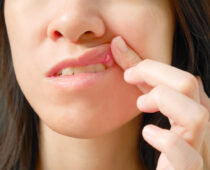
Last Updated on 19th April 2023
If you have unexplained soreness, mouth ulcers or an itchy sensation in your mouth, you may be having a reaction to your toothpaste, explain the dentists at Evesham Dental Health Team on Broadway Road.
Although pretty rare, toothpaste allergic reactions do happen and you may notice a rash around your mouth, swollen gums, or an itchy or burning sensation in your mouth, tongue irritation, mouth sores, and drying, cracking, or peeling lips.
According to Colgate, toothpaste contains several potential allergens. The most common culprit of toothpaste allergies is the flavouring, such as peppermint, spearmint or cinnamon added to freshen breath and mask the taste of other ingredients.
Other less common allergens include:
- Cocamidopropyl betaine (CAPB), a lathering or foaming agent.
- Sodium laurel sulphate (SLS), a detergent and foaming agent.
- Fluoride, a natural mineral that helps strengthen enamel and protect teeth from cavities.
- Propylene glycol, a preservative.
- Essential oils, such as tea tree oil which helps control bacteria in the mouth.
- Parabens, a preservative.
- Gluten, which stabilises and thickens toothpaste.
Some people may have experienced a dry, itchy scalp and skin caused by the sodium laurel sulphate in shampoo and body washes but hadn’t considered the ingredient may also appear in their toothpaste.
SLS is a harmless ingredient that helps toothpaste do its job more effectively. SLS cleans and helps remove food debris stuck in your mouth and teeth and is one of the most widely used synthetic detergents in toothpaste. Unfortunately, SLS can cause skin irritation and it aggressively irritates mouth ulcers.
SLS can be harsh on tender or sensitive skin. If your skin is sensitive or damaged, contact with SLS can make matters worse.
Whitening toothpastes can also cause a reaction in some people’s mouths and can cause something called sloughing. Tissue sloughing is when the skin of your inner cheeks or lips begins to peel, resulting in an irritated, raw, or burning sensation. Sensitivity to SLS is also a common cause for tissue sloughing.
The good news is that most toothpaste allergies are harmless and tend to go away once the toothpaste responsible is no longer being used. The reactions caused by the toothpaste can disappear as quickly as they appeared, so try changing your toothpaste and see if your mouth recovers.
Remember, mould ulcers that do not heal within 3 weeks can be a sign of mouth cancer, so don’t ignore them. If in doubt, get checked out – contact us and book a mouth cancer screening for your peace of mind.










